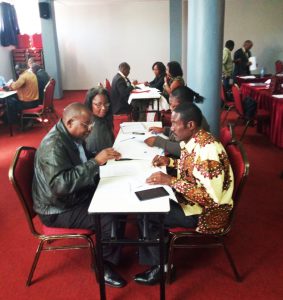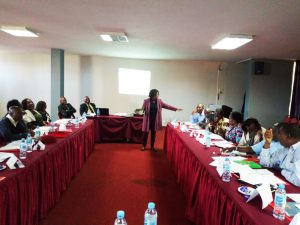As part of the efforts carried out by the National Organization of Mozambican Teachers (ONP) among its members and teachers in general, aiming at complying with the Code of Conduct, of this class, in schools, ZIPS, districts and provinces, the National Executive Secretariat of this socio-professional association, in coordination with the CIP (Public Integrity Center), held seminars to raise awareness and socialize the Code of Conduct in all provinces of the country, namely the provinces of Cabo delgado, Nampula, Niassa, Tete, Zambézia, Inhambane, Manica, Sofala, Gaza, Maputo Province and City, in the period from November 2018 to May 2019.
This report essentially aims to report in an exhaustive way the activities carried out in the framework of these seminars as well as the level of insertion of the participants (District Leaders), as well as proposals coming out of the different moments of reflection made in groups and in plenary.
It is in this context that CIP and ONP held training seminars on the socialization and massification of the code of conduct, covering 11 Provinces, corresponding to 114 Districts, in the period from November 2018 to May 2019. priority was given to the policy of gender equality and equity as a way of promoting social justice, one of the main challenges of the ONP. It was clear that teachers are very little trained in gender issues and in girls' education and its importance in their daily practices.
Results achieved
- Provincial and district leaders sensitized on the need for appropriation and massification of the Code of Conduct;
- Focal points created to replicate training in ethics and professional deontology in the districts covered;
- Improved understanding of the socio-professional reality of teachers;
- In-depth knowledge of the teacher's Code of Conduct, related to practical and theoretical aspects;
- Understanding the positive aspects of the Code of Conduct that interfere with the teaching process – learning and the quality of teaching;
- The importance of participatory interactivity between participants was deepened;
- The seminar was productive and inclusive;
- Hears sharing of experience and good practice;
- Contribution to changes in attitudes and negative behavior, showing the relevance of training teachers in gender issues, sexual and reproductive rights, code of conduct and non-sexist education;
- Objective conditions created to monitor replication activities;
- Standardized massification and socialization strategies of the Code of Conduct.
Table of participants in the Mozambican teacher code of conduct seminar
| No. | Place of Performance | H | M | HM |
| 01 | Cabo Delgado Province | 10 | 10 | 20 |
| 02 | Niassa Province | 10 | 10 | 20 |
| 03 | Nampula Province | 10 | 10 | 20 |
| 04 | Tete Province | 10 | 10 | 20 |
| 05 | Gaza Province | 13 | 7 | 20 |
| 06 | Inhambane Province | 13 | 5 | 18 |
| 07 | Zambezia Province | 10 | 14 | 24 |
| 08 | Manica | 11 | 10 | 21 |
| 09 | Sophala | 13 | 7 | 20 |
| 10 | Maputo Province | 6 | 5 | 11 |
| 11 | Maputo City | 5 | 6 | 11 |
| Total | –––––––––––––––––––––– | 102 | 94 | 205 |



